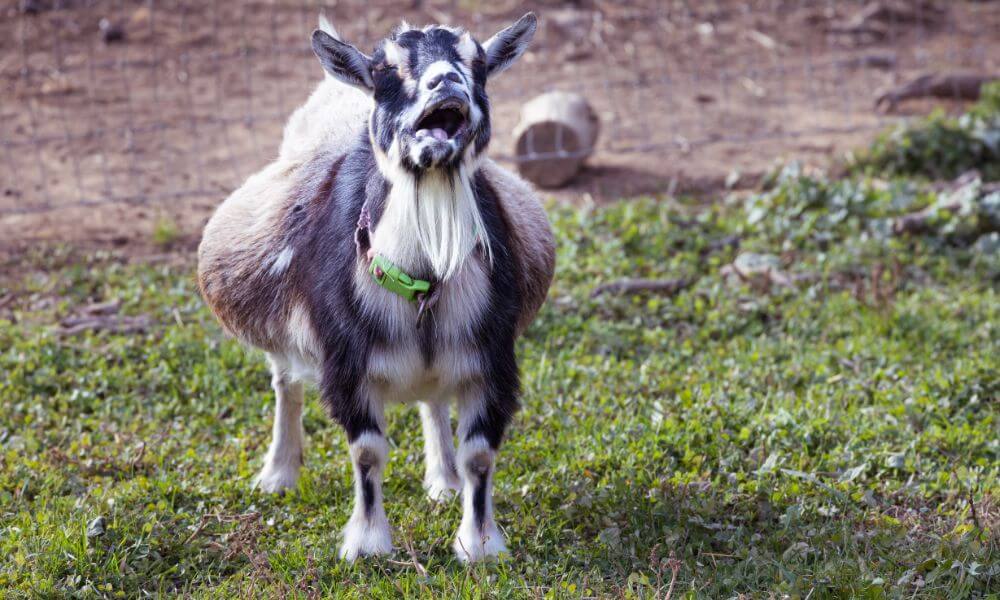Giving birth can, for many reasons, be a difficult experience for your goat.
There are many complications that can arise, leading to varying degrees of problems.
One issue which does arise, though statistically uncommonly, is that the doe does not pass her placenta after giving birth.
This can be worrying when you are expecting it to happen, and there can be consequences for leaving this unaddressed.
Today, we’re going to look at some of the common reasons your goat is not passing her placenta.
Then, we’re going to look at how you can help, what to do as well as what not to do.
Let’s get started.

Selenium deficiency
Statistically, the most common cause of goats not passing their placenta is a selenium deficiency.
Selenium is an essential mineral that plays a vital role in metabolism, which plays a greater role in birthing than you might think.
A goat with a selenium deficiency is going to have a great deal of trouble getting pregnant in the first place.
When it does get pregnant, the likelihood is that the kid will be weak, underdeveloped, or will even die before the mother gives birth.
It can also lead only to placenta retention.
If your goat is having a difficult birth or is not passing its placenta, then a selenium injection is the simplest route to helping her along.
More on the specifics of that later.
Let’s look at another common cause of placenta retention.
Mummified fetus
Following on, selenium deficiency can also lead to miscarriages in goat pregnancy.
Many other factors can, too, and miscarriages can lead to placenta retention.
When a developed fetus dies in utero, they can begin to become mummified.
This is a very unpleasant thought, but it’s one you’re going to have to grapple with if you’re either in the position that your goat is not passing its placenta or you have a birth coming up.
If you are aware that your goat has miscarried and is yet to give birth, then again, a selenium injection may be your best course of action.
Either way, keep a close eye on your goat in the weeks leading up to the birth.
Difficult delivery
Another of the most common causes of placenta retention is a very difficult delivery.
This can be painful and internally traumatic for the goat, and can also lead to placenta retention.
When a delivery is not smooth, your goat’s internal organs are shifted around in risky and uncomfortable ways.
This can cause the placenta to become stuck, and it can also mean that the muscles which would normally work to expel it do not contract correctly.
If the delivery was particularly difficult, then, your goat will likely have trouble passing the placenta.
Again, selenium is most likely your best chance.
| Related Articles |
|---|
Infection
Finally, a broad range of infections can cause placenta retention, too.
If your goat has a genital or internal infection, this can cause placenta retention for many reasons.
Again, you always need to keep a close eye on your goats in the weeks leading up to birth for this reason.
If you notice an infection early, you can treat it and hopefully resolve it before the doe goes into labor.
This will minimize the risk of placenta retention.
There are a number of ways you can treat placenta retention, so let’s look at that now.
What to do
Firstly, let’s look at what not to do.
The single worst thing you could do in the situation that your goat is not passing its placenta is pull on the placenta.
This can cause rips and tears and internal injuries for your goat, and most likely will not allow it to pass the placenta anyway.
Forcible separation can cause hemorrhaging.
The best way to combat placenta retention is to prevent it from happening in the first place.
This starts with observing your goat at length in the weeks and months leading up to its birth.
Make sure it is eating properly, getting enough exercise and activity, and is free of infection.
The overwhelming majority of placenta retention cases, though, involve selenium deficiency, as mentioned.
So, over the course of the pregnancy, make sure it is getting enough selenium in its diet.
Many mineral supplements include selenium.
If the goat is selenium deficient, you should have selenium injections on-hand for the birth.
If the goat is having trouble passing the placenta—this is defined as not passing it after 12 hours—then you can use selenium injections to help it along.
At the end of the day if nothing works, you should speak to a vet.
They will be able to diagnose and treat the root cause of the issue.
There are a number of possible causes, then, and the key is always to treat it gently.
If you are at all unsure, you should always get a vet involved.
Untreated placenta retention can lead to many, many issues if not properly addressed.
There are a number of things you can do to help yourself, but if you can’t get the placenta to release, then you’re going to need to get a vet involved.
Again, placenta retention is relatively uncommon in goats.
It does not happen very often, and in a smooth, healthy delivery, there’s really no reason whatsoever that it should happen.
If you are expecting a kidding doe to give birth soon, though, you should always be prepared for the possibility.
Being prepared for everything means no problems will take you by surprise.
Whether you’re a veteran goat breeder or this is your first time, the same things can always go wrong.
